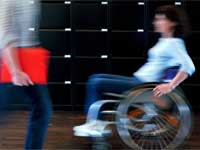
Half a million disabled people would lose out on benefits through the government’s reform to disability living allowance, it revealed today.
Proposals to replace DLA for people of working-age with a new personal independence payment (PIP) would result in 500,000 fewer people receiving the benefit by 2015-16.
The figure was included in a consultation document on the assessment criteria and eligibility thresholds for PIP, issued today, and comes despite a number of government concessions on the much-criticised reform, including:-
- Dropping plans to double the qualifying period for the benefit after the onset of disability from three to six months, as revealed today.
- Dropping plans to remove mobility payments from 80,000 state-funded care home residents.
- Revising the original assessment criteria following criticisms that the threshold for the benefit was too low.
The government’s plans threatened the ability of many disabled people to live independently, warned David Congdon, head of campaigns and policy at Mencap.
“It seems that those disabled people with lower level needs, but who nevertheless face extra costs associated with their disability, will lose out,” he said. “For example, a person with a learning disability who lives independently but who needs some level of help each week with things like cooking, shopping and sorting their household bills, may no longer be eligible for the benefit.”
He added: “Disabled people, many of whom already live on the brink of poverty, should not be forced to cover the significant additional costs of their disability on their own.”
Like DLA, PIP would be split into two components: a daily living part, equivalent to the care component of DLA, and reflecting people’s needs for assistance in supporting themselves; and a mobility component to support people to get around.
There would be two rates for each component- a standard and enhanced rate – in contrast to DLA, which has three care rates (lower, middle and higher).
Under the proposed assessment, disabled people would be assessed on their ability to carry out nine daily living activities, including preparing food and drink, bathing and grooming, communicating and engaging socially, and two mobility activities: moving around and planning and following a journey.
Points would be awarded according to people’s abilities to carry out tasks, with account taken of how far they need prompting, support or aids to do so.
(Pic: Voisin/Phanie/Rex Features)
Related articles
‘Government concealed scale of opposition to benefit reform’


 Bournemouth, Christchurch and Poole
Bournemouth, Christchurch and Poole  Hampshire County Council
Hampshire County Council  Lincolnshire County Council
Lincolnshire County Council  Norfolk County Council
Norfolk County Council  Northamptonshire Children’s Trust
Northamptonshire Children’s Trust  South Gloucestershire Council
South Gloucestershire Council  Wiltshire Council
Wiltshire Council  Wokingham Borough Council
Wokingham Borough Council  Children and young people with SEND are ‘valued and prioritised’ in Wiltshire, find inspectors
Children and young people with SEND are ‘valued and prioritised’ in Wiltshire, find inspectors  How specialist refugee teams benefit young people and social workers
How specialist refugee teams benefit young people and social workers  Podcast: returning to social work after becoming a first-time parent
Podcast: returning to social work after becoming a first-time parent  Podcast: would you work for an inadequate-rated service?
Podcast: would you work for an inadequate-rated service?  Family help: one local authority’s experience of the model
Family help: one local authority’s experience of the model  Workforce Insights – showcasing a selection of the sector’s top recruiters
Workforce Insights – showcasing a selection of the sector’s top recruiters 

 Facebook
Facebook X
X LinkedIn
LinkedIn Instagram
Instagram
Comments are closed.